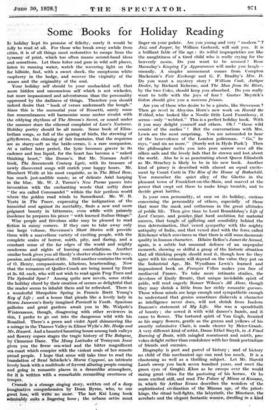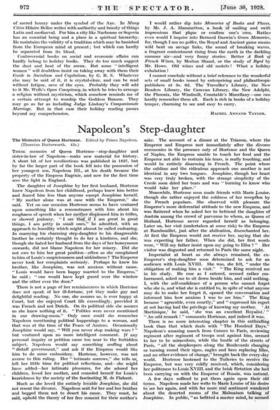Some Books for
Holiday Reading IF holiday kept its promise of felicity, surely it would be folly to read at all. For those who break away awhile from cities, it is of all things most restorative to escape from the tyranny of print, which too often means second-hand ideas and sensations. Let them loiter and gaze in wild soft places, listen to running water, watch the wavering light on the far hillside, find, with a sweet shock, the sumptuous white raspberry in the hedge, and recover the virginity of the senses and the originality of the soul.
Your holiday self should be your unshackled self, that more hidden and unconscious self which is not wickeder, but more impassioned and adventurous than the personality oppressed by the dailiness of things. Therefore you should indeed desire that " book of verses underneath the bough." Since this is the memorial year of Rossetti, surely some fine remembrances will harmonize some amber rivulet with the eddying rhythms of The Stream's Secret, or sound under the summer stars the ethereal complaint of Love's Nocturne. Holiday poetry should be all music. Some book of Eliza- bethan songs, so full of the quiring of birds; the strewing of gillyflowers, the chiming of fair fountains, that the requiems are as starry-soft as the bride-verses, is a rare companion. At a rather later period, the lyric becomes graver in its cadence and less liquid, for the -heart has become a " naked thinking heart," like Donne's. But Mr. Norman Ault's book, 'he Seventeenth Century Lyric, with its treasure of newly discovered songs will enrich your happy hours. • Mr. Humbert Wolfe at his most exquisite, as in The Blind Rose, has much just-audible music; as of delicate Ariel harping in the blue. Mr. W. J. Turner's New Poems passes into invocation with the enchanting words - that softly draw " the sea called Coromandel " within the fair perilous world Where - the golden road winds to Samarkand. Mr. W. B. Yeats in The Tower, expressing' the- indignation of the immortal soul against its mortality, finds a new and more poignant beauty in bitterness, even while with- printely insolence he prePares his peace " with learned Italian thingig" - Wise people and 'frivolous alike may be pleased to read -fiction in sunny corners. If they care to take away only One large volume, Stevenson's Short- Stories will provide them with a marvellous variety of exciting people, with the complete scales of horror, mirth, pity, and daring, and a constant sense of the far edges of the world and mighty sundowns and nights of burning constellations. Another similar book gives you all Ilardy's shorter studies on the irony, passion, and resignation of life. Still another contains the work of 0. Henry, compassionate, hilarious, heartrending. Now that the romances of Quiller-Couch are being issued by Dent at 3s. 6d. each, who will not wish to read again Troy Town and The Splendid Spur ? Among quite new novels, some strike the holiday chord by their creation of scenes so delightful that the reader seems to inhabit them and be refreshed. There is a wonderful Shropshire Spring in Francis Brett Young's Key of Life ; and a house that pleads like a lovely lady in Storm Jameson's finely imagined Farewell to Youth. Spacious galleries and great gardens await you in Mr. Walpole's Wintersmoon, though, disagreeing with other reviewers in this, I prefer to go out into the dangerous wild with his Rosalind. There's a green and violet April shimmering like a mirage in the Thames Valley in Elinor Wylie's Mr. Hodge and Mr. Hazard. And a haunted haunting house among lush valleys and flowery copses stages the tragic history of The Babyons, by Clemenee Dane. The Many Latitudes of Tennyson Jesse gives you the fierce sea-wind and the bitter magnificent sea- coast which conspire with the violent souls of her remote proud people. I hope that some will take time to read the translation of Rend Schickele's Maria Capponi, an intricate lovely book with a multitude of fervent alluring people coming and going in romantic places in a dreamlike atmosphere, for it is written with a remarkable reconciling sweetness of temper. Crusade is a strange singing story, written out of a deep imaginative comprehension by Donn Byrne, Who, to our great loss, will write no more. The last Kai Lung book admirably suits a lingering hour ; the urbane satire must linger on your palate. Are you young and very " modern " ? Jazz and Jasper, by William Gerhardi, will suit you. It is a brilliant fable of the' age : its wilful improprieties are. like the naughtiness of a tired child who is really crying for the heavenly moon. Do you want to be amused ? Rose Macaulay's Keeping Up Appearances will make you laugh— uneasily. 'A simpler amusement comes from Compton Mackenzie's Fair Exchange and G. F. Bradby's Mrs. D. Do you want a mystery story ? William Cook, Antique Dealer, by Richard Keherne, and The Man from the River, by the two Coles, should keep you absorbed. Do you really want to trifle with the joys of fear? Gustav Meyrick's Golem should give you a nouveau frisson.
Are you of those who desire to be a pirate, like Stevenson ? Then go revel in Aloysius Horn's new work on Harold the Webbed, who looked like a Nordic little Lord Fauntleroy, it seems—only " webbed." This is a perfect holiday book. With it you may delight yourself and others. Oh I " those wild counts- of the earlies " ! But the conversations with Mrs. Lewis are the most surprising. You are astounded to hear of the benevolence of the London policeman. " Go," he Says, "and sin no more." (Surely not in Hyde Park !) Then the philosopher melts you into pure sorrow over all the silken sails and the lovely lads that lie strewn and lost, about the world. Also he is as penetrating about Queen Elizabeth as Mr. Strachey is likely to be in his new book. Another kind of piracy is described with almost an equal excite- ment by Count Corti in The Rise of the House of Rothschild. You remember_ the . quiet alley of the Ghetto in "the pleasant town of Frankfurt-on-the-Main, and marvel at the power that crept out there to make kings tremble, and to decide great battles. , Is, your own personality, at ease on its holiday, curious concerning the personality of others, especially of those that wear the mask and cothurnus in the great altitudes of. public life. Then give pine to Lord Ronaldshay's Life of Lord Curzon, and ,poaderbhhat ,hard ambition: for material success, that tangle ;of ,eying _and sensibility behind ,the iron determination, that vexed, _sympathy with the mighty antiquity_ of. India, and that vexed duel with the force,called Kitchener which convinces us that there is still some daemonic quality in human character. Hilaire Belloc's James the Second, again,. is a _subtle but unsound defence of an unpopular monarch, showing so skilful a grasp of the historic situation that all thinking people should read it, though how far they agree with his estimate will depend on the value they put on the Industrial Age. Mr. Wyndham Lewis's learned. and impassioned book on Francois Villon makes you free mediaeval . France. To take more intimate studies, the devotees of Emily Bronte, that unique inviolable spirit of pride, will read eagerly Romer Wilson's AU Alone, though they may shrink a little from her richly romantic guesses. Those whose minds are large enough and sympathetic enough to understand that genius sometimes dishevels bevels a character as intelligence never does, will not. shrink from Isadora Duncan's statement of My Life. She was a spendthrift of beauty ; she sowed it with wild dancer's hands, and it came to flower. The tortured spirit of Van GOgh, frenzied as his angry flowers, gentle as the greens and yellows of his sweetly submissiVe Chair, is made clearer by Meier-Graafe. A very different kind of artist, Dame. Ethel Smyth, in A Final Burning of Boats, with mingled resentment and mirth, pro- vokes delight rather than condolence with her frank portraiture of friends and enemies.
Biography is part and parcel of history ; and of history no child of this mechanical age can read too much., If is a chastening as well 'as a thrilling subject. Let Mr. Harold Lamb sweep you back seven hundred years, and meet the green eyes of Genghiz Khan as he Sweeps over the world razing great cities for the pasturing of his horses. Or be more excited, still, and read The Palace of Minos, at KnOssos, in which Sir A describes "Arthur Evans descs the wonders or the sophisticated civilization of the Minoan age, of the priest- kings, the ritual bull-fights, the labyrinth, the Minotaur, the acrobats and the elegant fantastic, women, dwelling in a kin a' of sacred luxury under the symbol of the Axe. _In Many Cities Hilaire Belloc writei'with authority and beauty of things Latin and mediaeval. For him a city like Narbonne or Segovia has an essential being and a place in a spiritual hierarchy. He maintains the validity of a tradition which may be banished from the European mind at present ; but which can hardly be separated from its blood.
Controversial books on social and economic- affairs can hardly belong to holiday books. They do too much suggest the dust and heat of the arena. But some " intelligent women " will doubtless insist on taking away with them their Guide to Socialism and Capitalism, by G. B. S.• Whatever else may be said of it, it is crystal-clear, and can be read without fatigue, save of the eyes. Probably they will add to it Mr. Wells's Open Conspiracy, in which he tries to arrange a - religion without mysticism, which somehow reminds me of a certain attempt -to worship the Goddess Reason. They may go as far as including Judge Lindsay's Companionate Marriage. But in that case their holiday reading passes beyond my comprehension. I would rather dip into Memories of Books and Places,- by Mr. J. A. Hamnierton, a book Of smiling and swift impressiona that pique or confirm one's 'own. Rather even would I inquire into Bernard Darwin's Green Memories, for, though I am no golfer, the Royal-and Ancient game means wild bent on savage links, the sound of breaking waves, a fragrant contentment rising from the earth in the darkling 'summer air=and very funny stories: Better A Book of -French 'Wines, by Morton Shand, • or the study of Byrd by Mr. Howe. Old wines and old motets ! What a holiday exhalation !
• I cannot conclude without a brief reference to the wonderful sets of small books issued -by enterprising and philanthropic -publishers at 8s. lid. The Traveller's Library, the New Readers Library, -the Caravan Library, the New = Adelphi, the Phoenix, the Windmill, Constable's Miscellany—one can hardly remember them all. Each is rich in books of a holiday temper, charming to see • and easy to carry.
RACHEL ANNAND TAYLOR.









































 Previous page
Previous page